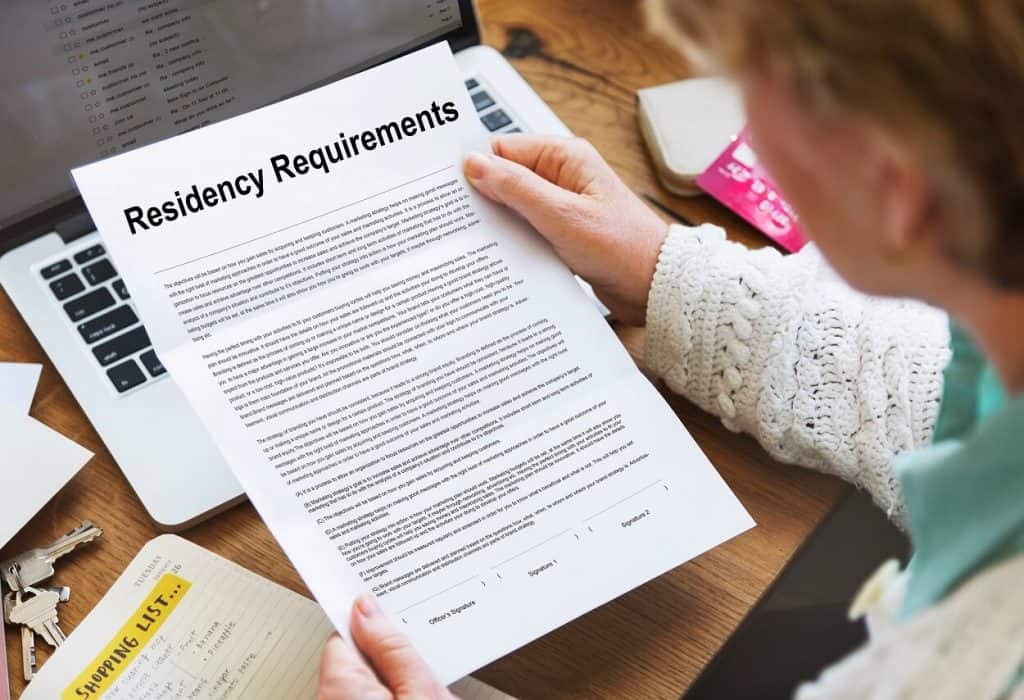If you wish to terminate your marital relations in Georgia, you must file a Complaint for Divorce with the right court that has jurisdiction over your case if you meet certain residency requirements.
In this article, we have gathered explanations of the basic Georgia divorce laws to facilitate your understanding of the process.
- Statute: Official Code of Georgia Annotated, Title 19, Chapter 5
- Residency Requirements: The plaintiff must be a bona fide state resident for at least 6 months before filing.
- Venue: Superior court in the county where the defendant lives.
- Grounds for Divorce: Both fault-based and no-fault grounds are allowed.
- Waiting Period: 30 days after the papers are served on the respondent in a no-fault divorce.
- Filing Fees: Approximately $215, depending on the county.
- Property Division: Equitable distribution of assets and liabilities between the parties.
- Child Custody: Determined by the child’s best interests.
- Child Support: Calculated according to the Georgia Child Support Guidelines with the child’s best interests in mind
- Alimony: Can be temporary or permanent, depending on the parties’ needs and ability to pay.
Divorce in Georgia: Fault and No-Fault

Georgia is a mixed divorce state, meaning the law recognizes both fault-based and no-fault grounds for marriage dissolution. No-fault grounds do not require any accusations or proof of either party’s wrongdoing that caused the ruined relationship. In contrast, fault-based grounds presuppose putting the blame on one of the spouses and necessitate solid evidence and even witness testimonies.
The reason you cite for ending your marriage may impact the type of divorce in Georgia, determining the course, character, duration, and cost of the process.
No-Fault Grounds
The only no-fault reason for divorce in Georgia specified by O.C.G.A. § 19-5-3 (13) is an irretrievably broken marriage. It is a perfect option for an uncontested divorce where both spouses agree on all the related terms since no one has to prove the partner’s misconduct or object to the accusations. However, if this ground is indicated in the Complaint, the court imposes a mandatory 30-day waiting period to give parties a chance to reconsider their decision and probably reconcile.
Fault-Based Grounds
Any fault-based ground cited as the reason for dissolving the marriage can make the process contested, highly contentious, and stressful if the respondent refuses to admit fault and agree to divorce. The petitioner will need to provide compelling evidence to prove the wrongdoing and maybe invite witnesses to testify and bear out their proof.
Fault-based grounds listed in O.C.G.A. § 19-5-3 include:
- Too close relation between the spouses by blood or marriage;
- Fraudulent marriage contract;
- Impotence;
- Mental incapacity;
- Wife’s pregnancy from another man without the husband’s knowledge;
- Incurable mental illness certified by the authorized party and continuous treatment for at least two years;
- Desertion for at least one year;
- Adultery;
- Habitual intoxication or drug addiction;
- Cruel treatment;
- Imprisonment for at least two years for a serious offense.
Georgia Divorce Requirements

To file for divorce in Georgia, you must meet its residency requirements. According to O.C.G.A. § 19-5-2, at least one spouse must have been a state bona fide resident for no less than 6 months before a Complaint is submitted to court. Non-residents should file in the county where a respondent lives and meets this residency requirement.
Besides, if you ask for marriage dissolution because it is irretrievably broken, you are required to comply with the Georgia divorce waiting period mandated by the law. The court will start reviewing your case no earlier than 30 days after the plaintiff has served the papers on the respondent.
How to File for Divorce in Georgia?

To file for divorce in Georgia, you must carefully follow the legal procedure. The process may vary depending on the case type and your family situation, but the core steps usually include:
- Collection and completion of the papers necessary for your case;
- Filing the initial paperwork with the court and paying a filing fee;
- Serving the respondent and filing the proof of service with the court;
- Waiting 30 days in case of no-fault divorce;
- Attending the seminar for parents if minor children are involved;
- Filing additional financial and child-related forms;
- Attending a trial if the case is contested;
- Receiving a final judgment.
While some steps are mandatory, others will depend on your specific case and individual circumstances. It is highly advisable to research the issue, clarify the details with the county court’s clerk, and consult a family lawyer if needed.
How Long Does a Georgia Divorce Take?

An average divorce lawsuit may take from several weeks to several years. There’s no definite answer to this question since the timeline depends on various factors. When getting divorced in Georgia, you should consider your case type, grounds indicated in the Complaint, the number and complexity of unresolved disputes, and your and your spouse’s willingness to cooperate.
Uncontested cases that do not involve disagreements can be completed much quicker since all the issues are settled, so the judge only needs to approve your terms and sign the decree. Mind that if you file for a no-fault divorce due to an irretrievably broken marriage, you will need to wait at least 30 days from the date the defendant was served with the papers. Only after this mandatory waiting period is over, the court may start reviewing your case. Yet, the court’s schedule and the judge’s caseload may prevent them from signing your decree on the 31st day already.
Furthermore, the defendant’s behavior may also influence the duration of the process. If they delay the answer to the Complaint for Divorce, the court can wait 46 days from the date the papers were served and grant you divorce by default if there is still no response. If you do not know your spouse’s whereabouts and served them by publication, the judgment may be signed no earlier than 61 days from the date of the first publication. So, depending on your circumstances, an uncontested divorce in Georgia may last from 31 to 61 days, on average.
Things are more complicated with contested cases that require a lot of settlements to be made. For a divorce to be finalized in Georgia, just like in any other state, all the matters related to minor children, property division, and spousal support must be resolved so that the judge can issue the final binding orders. If these issues are highly disputable and the parties are uncooperative, their resolution may require many months and several hearings or trials. In most complex cases, the litigation may drag on for 2 years or even more.
What Are the Filing Fees for Divorce in Georgia?
No uniform filing fee for divorce in Georgia is established by state law. The cost varies from county to county but generally revolves around $215. You may need to pay extra for any additional motions or requests filed after the judgment.
Other court expenses may include sheriff’s services fees ranging from $10 to $50, as well as costs for copies, transcripts, mailings, etc. Please contact your county court’s clerk and clarify the legal fees in your location.
How Much Does a Divorce Cost in Georgia?

The average cost of divorce in Georgia may range from $500 to $25,000. Total expenses depend on the case type and complexity, each family’s unique circumstances, and the level of cooperation between the parties.
Typically, uncontested cases are cheaper since spouses usually settle all disputes on their own and do not have to hire lawyers, saving on their hourly rates. If they manage to cope with the paperwork independently and do not need even the simplest consultation with a law expert, their total expenses may entail only legal fees for filing, copies, service of process, etc., which is around $500.
Contested divorces are much more expensive, sometimes reaching up to $20,000-$30,000 or more. Such cases usually require spouses to hire attorneys to help them resolve disputes and defend their rights in court. Georgia divorce lawyer’s fees range between $200 and $600 per hour, depending on their location, experience, and reputation. Highly contested issues and the parties’ reluctance to cooperate would require too much time for the resolution, resulting in thousands of dollars paid to the attorney. The longer your litigation will drag on, the higher your expenses will be.
Besides, too complex disputes involving minor children, shared business, or high-value assets can also require the involvement of other experts like forensic accountants, business appraisers, custody evaluators, vocational experts, etc. They may have hourly rates or charge a fixed fee for the final review. In any case, you may need to pay about $1,000-$5,000 for the services of each specialist involved.
Where to File Your Divorce Case?

The Complaint for dissolution of marriage in Georgia should be filed with the superior court in the county where either party lives. Yet, you must meet the residency requirements to be eligible to initiate the action in your county. If you are a non-resident, you should file in the county where the other spouse resides for at least 6 months.
How Property is Divided During Divorce in Georgia?
Georgia divorce laws dictate equitable property division, which is not always equal. So, the answer to the question, “Is Georgia a 50/50 divorce state?” is “No.”
Normally, only marital property acquired by a couple during the marriage is subject to division. Separate property obtained by each spouse before the marriage, inherited, or received as a gift from the third parties is not divided but stays with the owner.
The court divides all assets and liabilities between the parties as it sees just and equitable. When making these decisions, the judge is guided by the “source of funds” rule to define a fair share to award to each of them.
Understanding Alimony and Child Support in Georgia

Alimony and child support matters in Georgia divorce are regulated by O.C.G.A. §§ 19-6-1 — 19-6-53. Spouses can settle them on their own or wait for the court to make proper decisions.
Since both parents are obliged to provide for their minor children until they reach maturity, a non-custodial parent typically pays child support to a custodial parent. In this case, the spouse with primary custody spends money on the kids directly and receives the payments from the other party as a trustee for the minors, using it for their benefit. Complex child support calculations are conducted according to the Georgia Child Support Guidelines outlined in O.C.G.A. §19-6-15. The right to these payments belongs to children, so neither parent can waive it.
Alimony, the financial support of one party paid by the other, can be temporary or permanent. There is no specific formula to calculate its duration and amount. The court makes these decisions based on a number of factors. They consider both parties’ needs, ability to pay, age, health, earning capacity, contribution to the marriage, as well as the length of marriage for alimony in Georgia to be awarded.
How Child Custody Is Determined in a Divorce in Georgia?
If you divorce in Georgia with a child or children, custody-related matters must be determined according to the “children’s best interests” principle as stipulated in the Child Custody Proceedings (O.C.G.A. §§ 19-9-1 — 19-9-7). The court considers all factors relevant to the minors’ safety, happiness, and well-being and makes corresponding decisions. If children are 14 years or older, they may choose a parent with physical custody unless the court decides that this is not in their best interests.
What Is a Wife Entitled to in a Divorce in Georgia?

Under Georgia divorce laws, a wife may be entitled to anything following the “equitable property distribution” and “children’s best interests” principles, just like a husband. The court does not give any preference to either party regarding asset division, alimony, or child-related matters based on gender. Georgia statutes strictly guide all the decisions made in the divorce case, with no exceptions.
The Bottom Line
Divorce can be extremely challenging and exhausting emotionally, physically, and financially. Knowing the basic laws can facilitate understanding of what is expected of you and what you can expect from the process, minimizing the stress of the unknown. We have outlined the core divorce issues in Georgia to paint the general picture for you. Still, a consultation with an experienced family attorney is highly advisable for the best outcome.



